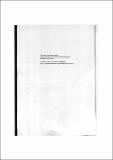| dc.contributor.author | Makau, B. M. | |
| dc.date.accessioned | 2011-05-03T12:13:01Z | |
| dc.date.available | 2011-05-03T12:13:01Z | |
| dc.date.issued | 1986 | |
| dc.identifier.citation | Makau, B. M. (1986) Improving teacher effectiveness in the schools of Kenya: approaches to quality learning through cost-saving professional management. Discussion Paper 281, Nairobi: Institute for Development Studies, University of Nairobi | en_GB |
| dc.identifier.uri | https://opendocs.ids.ac.uk/opendocs/handle/20.500.12413/759 | |
| dc.description.abstract | In the developing world the planner is faced with the challenge of
developing approaches which lead to higher quality learning while keeping down the costs of education. A well qualified and contented teaching force is regarded as one of the key factors in raising quality. Yet, given financial
constraints which are partly explained by rapid growth in enrolments,
it may not be feasible for a country to make substantially higher allocations
to teacher training and remuneration, and other inputs which facilitate the
teacher's work.
This paper conceptualises teacher effectiveness in terms of learning
outcomes and explores in-system factors which influence it among Kenya's
school teachers. Analysis of data shows that the teacherfe work could lead
to higher quality through the provision of more funds for physical facilities,
learning resources, more attractive remuneration, accelerated replacement
of untrained teachers and the improvement of professional management. The
discussion centres on the role of management, training and remuneration. It
is suggested that while rationally administered attractive salary scales
would encourage the teaching force to work for excellence, improvement of
professional management would give scope for effective in-service training
which would be cheaper than residential pre-service training, and would
motivate and guide teachers to facilitate higher achievement by pupils. In
order to maximise these outcomes of management, it is recommended that in the
primary sector the district infra-structure should be made efficient in all
areas; in the secondary sector, administrative and inspection services should
be expanded and devolved to the districts, heads of schools should be systematically
trained to be better professional managers and the participation
of communities in school management should be streamlined. | en_GB |
| dc.language.iso | en | en_GB |
| dc.publisher | Institute for Development Studies, University of Nairobi | en_GB |
| dc.relation.ispartofseries | Discussion Papers;281 | |
| dc.rights.uri | http://creativecommons.org/licenses/by-nc-nd/3.0/ | en_GB |
| dc.subject | Education | en_GB |
| dc.title | Improving teacher effectiveness in the schools of Kenya: approaches to quality learning through cost-saving professional management | en_GB |
| dc.type | Series paper (non-IDS) | en_GB |
| dc.rights.holder | Institute for Development Studies, University of Nairobi | en_GB |
| dc.identifier.blds | 317523 | |


